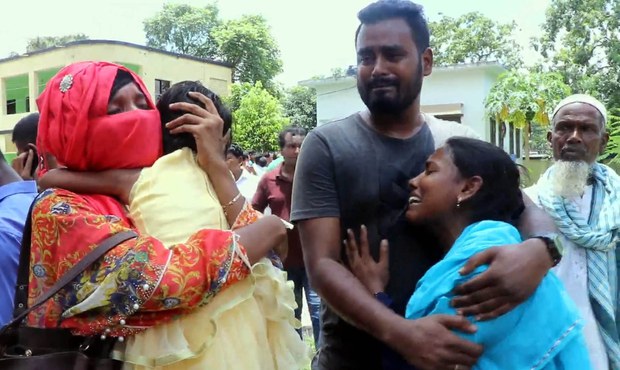Bangladesh Court Sentences 9 to Death for 1994 Attempt to Kill Hasina
2019.07.03
Dhaka
 Relatives of Bangladeshi opposition activists hug each other outside a special tribunal in Pabna district, July 3, 2019.
Relatives of Bangladeshi opposition activists hug each other outside a special tribunal in Pabna district, July 3, 2019.
A court sentenced nine BNP party members to death and handed life imprisonments to 25 others Wednesday after convicting them over a 1994 train attack aimed at killing Sheikh Hasina, leader of the rival Awami League who now rules Bangladesh, a prosecutor said.
The Bangladesh Nationalist Party (BNP), the main opposition party today, described the ruling that came 25 years after the fact as politically motivated and a vengeful act by Prime Minister Hasina’s government.
Hasina was targeted for assassination in the plot because the attackers hurled several Molotov cocktails at the train and one exploded “just four feet from Sheikh Hasina,” prosecutor M. Akhtaruzzaman told BenarNews after the verdict and sentencing by a special tribunal in Pabna district.
“She narrowly survived,” he said.
Hasina, who was an opposition leader when the BNP was in power back then, was among the train’s passengers when it was attacked with Molotov cocktails while arriving at the Ishurdi station, authorities said. She was traveling to the northwestern town of Syedpur, where she was scheduled to address a rally.
About half a dozen people were wounded, but Hasina emerged unhurt, officials said. The chaotic situation was placed under control when police fired shots into the air, they said.
All of the convicts belonged to the BNP, but only 34 of the 52 people originally charged in the case were present in court on Wednesday, Akhtaruzzaman said.
“Others have been fugitives for years,” he said.
Thirteen of the convicts were each sentenced in absentia to 10 years in prison, Akhtaruzzaman said, adding that the court had dropped the charges against five of the defendants who had died of natural circumstances while the case was on trial.
Defense lawyer Masud Khandker said his clients were “highly aggrieved” by the verdict.
“We will appeal against this unacceptable judgment before the High Court,” he told BenarNews.
‘Revived for political gain’
Mirza Fakhrul Islam Alamgir, secretary-general of the BNP, whose leader, former Prime Minister Khaleda Zia, remains in jail after a court found her guilty last year of misappropriating funds from a charitable trust, rejected the sentencing. He said it was intended to oppress the opposition.
“This verdict reflects the political vengeance of the present government,” Alamgir told BenarNews,
“The case was filed 25 years ago. This case has been revived for political gain,” he said. “The purpose of this case is to oppress the opposition.”
“The attack on Sheikh Hasina must be condemned,” he said. “But questions can be raised about the investigation process. The investigation must be transparent.”
According to a statement posted on the website of Hasina’s Awami League party, the prime minister has survived at least 19 attempts on her life.
Twenty-four people were killed and more than 300 injured on Aug. 21, 2004, when 13 grenades exploded after Hasina had finished addressing an anti-terrorism rally attended by thousands of supporters in the capital Dhaka, officials said.
On Oct. 10 last year, a Bangladeshi court sentenced 19 people to death and Zia’s son, Tarique Rahman, to life imprisonment over that attack. Rahman, who lives in London, has rejected the charges.
Prosecutors said members of the militant group Harkat-ul Jihad-al-Islami Bangladesh carried out the grenade attack, with support from influential members of the then BNP-led government, including Rahman.
Hasina, who narrowly escaped assassination as supporters shielded her from the grenade blasts, has been prime minister since January 2009. Aides said she suffered permanent hearing impairment due to the explosions.
Hasina won her third consecutive term in December in a general election that poll observers had described as flawed.
‘Not so severe’
The train attack in Ishurdi was “not so severe” compared with the 2004 grenade attack, according to Nizam Uddin Ahmed, a political commentator and professor at Chittagong University.
“Possibly, the then-ruling BNP leaders and activists in Pabna attacked the train with a view to preventing Hasina from addressing the public rally,” he told BenarNews.
But the Aug. 21 grenade attack was aimed at killing Hasina, Ahmed said.
“There is no doubt about it,” he said.
Hasina’s father and Bangladesh’s founding president, Sheikh Mujibur Rahman, was killed in a military coup on Aug. 15, 1975. Rahman was assassinated with other members of his family, but Sheikh Hasina was out of the country with her sister, Sheikh Rehana.







